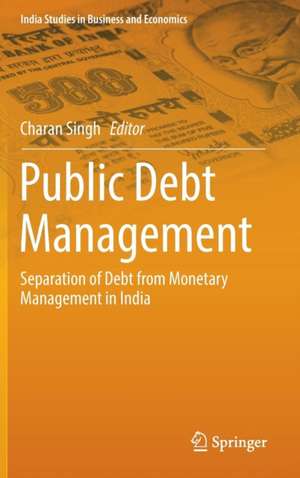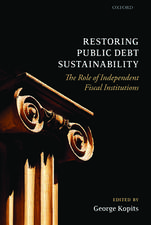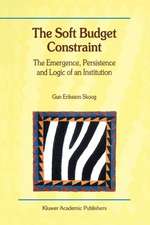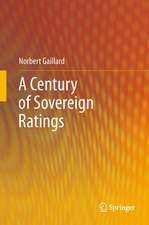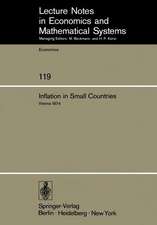Public Debt Management: Separation of Debt from Monetary Management in India: India Studies in Business and Economics
Editat de Charan Singhen Limba Engleză Hardback – 25 noi 2016
| Toate formatele și edițiile | Preț | Express |
|---|---|---|
| Paperback (1) | 637.46 lei 6-8 săpt. | |
| Springer India – 29 iun 2018 | 637.46 lei 6-8 săpt. | |
| Hardback (1) | 643.65 lei 6-8 săpt. | |
| Springer India – 25 noi 2016 | 643.65 lei 6-8 săpt. |
Din seria India Studies in Business and Economics
- 18%
 Preț: 734.27 lei
Preț: 734.27 lei -
 Preț: 361.77 lei
Preț: 361.77 lei - 18%
 Preț: 1006.24 lei
Preț: 1006.24 lei - 18%
 Preț: 952.89 lei
Preț: 952.89 lei - 20%
 Preț: 883.20 lei
Preț: 883.20 lei -
 Preț: 186.41 lei
Preț: 186.41 lei - 15%
 Preț: 636.94 lei
Preț: 636.94 lei - 15%
 Preț: 647.27 lei
Preț: 647.27 lei - 15%
 Preț: 646.30 lei
Preț: 646.30 lei -
 Preț: 409.89 lei
Preț: 409.89 lei -
 Preț: 372.98 lei
Preț: 372.98 lei -
 Preț: 389.88 lei
Preț: 389.88 lei - 18%
 Preț: 894.03 lei
Preț: 894.03 lei - 15%
 Preț: 644.30 lei
Preț: 644.30 lei - 15%
 Preț: 528.30 lei
Preț: 528.30 lei - 15%
 Preț: 644.82 lei
Preț: 644.82 lei - 15%
 Preț: 660.37 lei
Preț: 660.37 lei -
 Preț: 386.00 lei
Preț: 386.00 lei - 20%
 Preț: 559.74 lei
Preț: 559.74 lei - 15%
 Preț: 643.99 lei
Preț: 643.99 lei -
 Preț: 386.68 lei
Preț: 386.68 lei -
 Preț: 390.08 lei
Preț: 390.08 lei -
 Preț: 365.76 lei
Preț: 365.76 lei -
 Preț: 393.52 lei
Preț: 393.52 lei - 15%
 Preț: 656.74 lei
Preț: 656.74 lei - 24%
 Preț: 699.22 lei
Preț: 699.22 lei -
 Preț: 369.80 lei
Preț: 369.80 lei - 15%
 Preț: 642.68 lei
Preț: 642.68 lei -
 Preț: 388.90 lei
Preț: 388.90 lei - 15%
 Preț: 649.87 lei
Preț: 649.87 lei - 15%
 Preț: 645.28 lei
Preț: 645.28 lei -
 Preț: 372.66 lei
Preț: 372.66 lei -
 Preț: 389.17 lei
Preț: 389.17 lei - 20%
 Preț: 569.00 lei
Preț: 569.00 lei - 15%
 Preț: 641.85 lei
Preț: 641.85 lei -
 Preț: 392.97 lei
Preț: 392.97 lei - 15%
 Preț: 643.84 lei
Preț: 643.84 lei - 24%
 Preț: 656.29 lei
Preț: 656.29 lei - 15%
 Preț: 651.34 lei
Preț: 651.34 lei - 15%
 Preț: 641.53 lei
Preț: 641.53 lei - 15%
 Preț: 640.37 lei
Preț: 640.37 lei - 20%
 Preț: 569.85 lei
Preț: 569.85 lei
Preț: 643.65 lei
Preț vechi: 757.24 lei
-15% Nou
Puncte Express: 965
Preț estimativ în valută:
123.18€ • 127.08$ • 104.25£
123.18€ • 127.08$ • 104.25£
Carte tipărită la comandă
Livrare economică 05-19 martie
Preluare comenzi: 021 569.72.76
Specificații
ISBN-13: 9788132236474
ISBN-10: 8132236475
Pagini: 227
Ilustrații: XXI, 211 p. 35 illus.
Dimensiuni: 155 x 235 x 14 mm
Greutate: 0.51 kg
Ediția:1st ed. 2016
Editura: Springer India
Colecția Springer
Seria India Studies in Business and Economics
Locul publicării:New Delhi, India
ISBN-10: 8132236475
Pagini: 227
Ilustrații: XXI, 211 p. 35 illus.
Dimensiuni: 155 x 235 x 14 mm
Greutate: 0.51 kg
Ediția:1st ed. 2016
Editura: Springer India
Colecția Springer
Seria India Studies in Business and Economics
Locul publicării:New Delhi, India
Cuprins
Chapter 1. Introduction.- Chapter 2. Public Debt Management: Reflections on Strategy & Structure.- Chapter 3. Cash Management System.- Chapter 4. Debt Management by Central Government.- Chapter 5. Financial Regulation and Public Debt Management.- Chapter 6. Cash and Debt Management in .- Chapter 7. Fiscal Responsibility and Budget Management (FRBM)ACT: Issues and Perspectives.- Chapter 8. Public Debt Sustainability in Developing Asia.- Chapter 9. A Separate Debt Management Office.
Notă biografică
Charan Singh is RBI Chair Professor of Economics at the Indian Institute of Management, Bangalore, India. Earlier, he was a Senior Economist at the Independent Evaluation Office (IEO) of the International Monetary Fund (IMF), Washington DC from August 2009 to November 2012. He earned his doctorate in Economics from the University of New South Wales, Sydney, Australia and was a visiting scholar (post-doctorate studies) for more than a year each at Department of Economics, Harvard University, and the Stanford Center for International Development, Stanford University. Dr. Singh has worked extensively for more than two decades in the Reserve Bank of India where he joined as a Research Officer in 1984. His extensive career in the Reserve Bank included many assignments in operational and research departments, include half a decade in debt management, in addition to fiscal policy management. Prior to joining the Reserve Bank, Dr. Singh worked, for a short period, as a Management Trainee in Punjab National Bank. His current policy interests include fiscal policy and debt management, monetary policy, and international economics.
Textul de pe ultima copertă
This book examines the objectives of public debt management and the re-emerging issue of separating monetary policy formulation from fiscal and debt management. The recent Great Recession has resulted in a rethink of the objectives and working of macroeconomics, and in many countries, including India, has led to the scope of fiscal operations being expanded and debt-to-GDP ratios increasing significantly. Consequently, debt management has encountered considerable difficulties, and the need for coordination between monetary and debt management has assumed greater significance. The book discusses the important issue of the independence of central banks and the need for coordination between debt managers, monetary authorities and finance ministries if debt operations are separated from monetary management.
Caracteristici
Presents the views of nine respected authors including policymakers, academics and members of government and multilateral institutions such as the Reserve Bank of India and the Asian Development Bank Explores the feasibility of separating debt management from monetary authority in India Offers a pointed discussion on the merits and demerits of the separation of debt from monetary management, and the independence of central banks Provides valuable insights for practitioners and policymakers, especially those working in government and central banks across the world, particularly in emerging markets Includes supplementary material: sn.pub/extras
